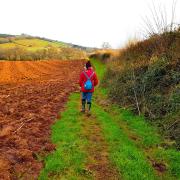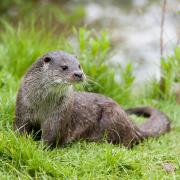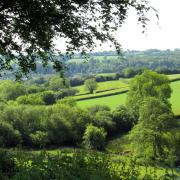A farm on the edge of Dartmoor is growing a rather unique crop, supplying zoos across Europe with fresh weekly supplies of eucalyptus for their koalas. They grow around 40 varieties to meet the needs of these adorable, if fussy, marsupials.
With their wide eyes, slow movements, general cuteness and of course being synonymous with the Australian bush – everyone loves the koala. It is surprising to know that nestled deep in the countryside on the southern edge of Dartmoor is a eucalyptus farm that sends out weekly orders of foliage across the UK and Europe to feed our furry friends.
Paul and Sally MacPherson have been running Mac Foliage, their 40-acre eucalyptus farm for more than 38 years. They took over and expanded the enterprise from Sally’s father – a forester – who had a small farm selling mainly to florists. It was a time in their lives when Paul and Sally had little capital, but bags of energy and enthusiasm. ‘I studied agriculture at Seal Hayne in Newton Abbot and as part of this had spent a year in Australia so had first-hand knowledge of life amongst the koalas,’ says Paul. ‘And from Sally’s father we learnt and came to love everything eucalyptus.’

Mac Foliage lies in a south facing valley near Bovey Tracey with views up to Haytor and down to the sea beyond Teignmouth. A glorious and peaceful spot, its sunny aspect combined with free-draining acidic soil makes it particularly suited for eucalyptus growth. However, there is no room for complacency. ‘Whilst a bit of snow may not a problem for the trees, a harsh frost of minus 10 to minus 15 degrees and beyond can wipe out a crop overnight,’ warns Paul. ‘Global warming seems to be helping us out on that score at present!’
Despite their beauty, grace and elegance, eucalyptus leaves are filled with toxins that make them inedible to most mammals – at Mac Foliage deer are discouraged as the leaves have proved fatal to them when consumed in large quantities. Koalas are one of the few species that can consume them – eating up to 3 kilos of fresh leaves per day. Their special fibre digesting organ, a caecum, helps to detoxify the chemicals in the leaves.
Whilst there are over 700 species of eucalyptus trees, koalas only feed on leaves from about 50 of these with each koala’s choice varying according to locality and season. To cater for this Paul and Sally grow nearly 40 varieties. ‘Each zoo carefully monitors what the koalas are eating and advises what species should be in their order each week,’ explains Paul. ‘Some, like Eucalyptus viminalis and Eucalyptus neglecta are particularly strong scented and suited to the southern koala, whilst the Eucalyptus aggregata and Eucalyptus nicholii are better suited the smaller, northern koala. If there is not the correct eucalyptus species on offer, a koala will stop eating.’

They certainly take fussiness to the extreme. Fortunately, Mac Foliage’s extensive collection means there is always something that they will eat.
In the UK, there are only two zoos which currently house koalas – Edinburgh which has the northern koala and more recently Longleat which in 2017 began housing the southern koala. Mac Foliage supplies eucalyptus to both.
‘Koalas are in serious decline. Bush fires and urbanisation have had a dramatic effect on their habitat in Australia. This, combined with infectious diseases, has led to koalas signalled as being on the extinct list within a decade.

Both Edinburgh and Longleat work in collaboration with Australian zoos and agencies and are part of research and conservation projects to protect the species. In 2021 Longleat welcomed Hazel, the first ever southern koala to have been born in Europe.
‘I like to feel that in providing an array of different species of fresh eucalyptus come rain or shine we are playing our small part in protecting these very special mammals,’ says Paul.
Fresh is definitely best as far as koalas are concerned - if the leaves start to wilt toxins build up and this can make a koala quite poorly. For Mac Foliage this means cutting the leaves and organising their transport as soon as possible. Monday through to Wednesday are picking and packing days and Wednesday and Thursday are transportation days. For the UK and some European zoos this is by bespoke road transport which means that the eucalyptus can be kept in water throughout the journey. However, before the leaves can be dispatched to European zoos, they have to be checked by the Government Plant Health Authority and issued with a certificate.

‘There has never been a problem with this as we are always very careful,’ explains Paul. ‘However, it currently costs £160 per visit, so does add to our overall costs.’
Before Brexit this was not necessary. For some overseas deliveries, the eucalyptus is sent by air. Collected on Wednesday, the leaves are transported by road to Heathrow and London City airports and will be ready for the koalas the following morning. Years of experience has made for a well-honed travel operation.
‘In our business there is no room for late deliveries and even during Covid we had to continue our routine as normal,’ says Paul.
In spring Thursday and Fridays are earmarked as pruning days – and with eucalyptus being a particularly fast-growing tree this is absolutely necessary.

‘A eucalyptus can easily grow up to two metres a year and it is essential for us to regularly prune the trees to keep them small and compact for cutting and so the leaves are more palatable – koalas are not keen on tough or woody leaves!’
Restocking with new trees takes place in late summer and autumn so there is work to be done throughout the year.
Mac Foliage has been very much a family business and Paul and Sally’s sons are also involved with their own businesses on the farm supplying fodder for the koalas.
Paul and Sally have recently diversified and have established a summer glamping site - Gumtree Tipis - which offers four bespoke Sioux American style tipis nestled within the charms of the eucalyptus forest. It is glamping in luxury with beds, showers and cooking facilities. And being near both the sea and the moor it is an ideal visitor spot.

‘Visitors are immersed in nature and able to enjoy the benefits of camping without having to pack all the gear – and they get to sleep in a very comfortable bed. What more could one wish for,’ enthuses Paul. Now in its second year, this new enterprise is going from strength to strength and works very much in harmony with the eucalyptus farm.
In the winter months Paul and Sally might take time to visit a zoo to see the koalas first-hand.
‘We have visited many of our European zoos, including Vienna, Antwerp, Budapest, Beauval to name a few,’ says Paul.
Koalas are not easy animals to look after and despite their inactivity, they can easily become stressed. ‘To see them thriving on our supply of Dartmoor grown eucalyptus is what makes it all worthwhile.’
macfoliage.co.uk
gumtreetipis.co.uk



























